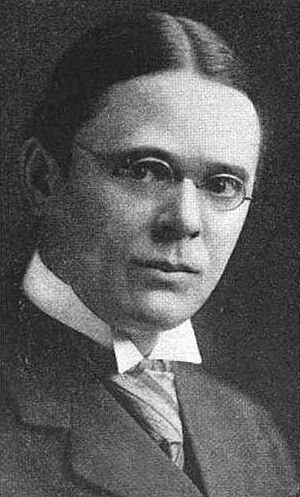Roscoe Pound facts for kids
Quick facts for kids
Roscoe Pound
|
|
|---|---|

Pound circa 1916
|
|
| Born |
Nathan Roscoe Pound
October 27, 1870 Lincoln, Nebraska, U.S.
|
| Died | June 30, 1964 (aged 93) Cambridge, Massachusetts, U.S.
|
| Alma mater | University of Nebraska–Lincoln (BS, PhD) |
| Scientific career | |
| Fields | Botany Law |
| Institutions | Harvard University University of Nebraska–Lincoln University of California, Los Angeles |
| Influences | Louis Brandeis |
| Influenced | Zechariah Chafee, Charlie Munger |
Nathan Roscoe Pound (born October 27, 1870 – died June 30, 1964) was an important American expert in law and a teacher. He led the University of Nebraska College of Law as its dean from 1903 to 1911. Later, he became the dean of Harvard Law School from 1916 to 1936. He also taught at other famous universities, including Northwestern University and UCLA School of Law. Many people consider Pound one of the most important legal thinkers of the 20th century.
Early Life and Learning
Roscoe Pound was born in Lincoln, Nebraska. His parents were Stephen Bosworth Pound and Laura Pound. His sister, Louise Pound, became a well-known expert in language and old stories.
Pound first studied botany, which is the study of plants, at the University of Nebraska–Lincoln. He earned his first degree in 1888 and a master's degree in 1889. In 1889, he started studying law at Harvard University. He studied there for one year but did not get a law degree. Even without a degree, he passed the bar exam in Nebraska. This meant he could practice law. In 1898, he earned the first PhD in botany from the University of Nebraska. From 1899 to 1907, he taught law at the University of Nebraska.
The University of Nebraska started its first football team the year after Pound finished his studies. Pound loved sports and traveled with the team to their games. He even wrote about the team for the student newspaper and sometimes helped referee games. He created many cheers and songs for the team. He also helped build a strong fan base that traveled to support the team. This tradition of traveling fans continues for the Cornhuskers team today.
Career in Law
In 1903, Roscoe Pound became the dean of the University of Nebraska College of Law. In 1911, he started teaching at Harvard University. By 1916, he was made dean of Harvard Law School. He held this important job until 1937. During his career, he wrote many books and articles about law. Some of his famous works include "Spurious Interpretation" (1907) and "The Spirit of the Common Law" (1921).
In 1908, he helped start the first journal in the United States that focused on comparing different countries' laws. This journal was called the Annual Bulletin. Pound also taught about Roman law, which is the legal system of ancient Rome. He was very good at Latin and could translate Roman law texts into English.
Pound was a key leader in a movement called "sociological jurisprudence." This idea focused on how laws should fit the real-life needs of people and society. He believed that law should be practical and help solve problems in the world. While he was dean at Harvard, the number of students studying law almost doubled. However, his teaching standards were very high. About one-third of the students who started did not finish their degrees. Many of these students later became important leaders in government.
In 1929, President Herbert Hoover asked Pound to join the Wickersham Commission. This group looked into important issues like law enforcement and the justice system.
Pound initially supported President Roosevelt's "New Deal" plans, which aimed to help the country during the Great Depression. However, he later disagreed with some of these ideas. In 1937, he left his role as Dean of Harvard Law School. He continued to teach and share his ideas about how government and law should work. He also joined the faculty of UCLA School of Law in 1949, when the school first opened. He taught there until 1952.
Ideas About Law
Roscoe Pound made a big impact on how people think about law. He believed that law should be like "social engineering." This means that lawmakers should act like engineers. They should use laws as tools to fix problems in society. Pound thought that to understand laws, you need to look at what "interests" they protect. These interests could be individual, like protecting a person's life or property. They could also be broader social interests, like keeping a community safe.
Personal Life
In 1903, Roscoe Pound helped start the Society of Innocents. This is an important honor society for senior students at the University of Nebraska. Pound is also a member of the Nebraska Hall of Fame. He was a Freemason, which is a member of a fraternal organization. He held leadership roles in his local lodge and gave lectures on Masonic topics.
In 1946, Pound helped a 22-year-old named Charlie Munger get into Harvard Law School. Charlie Munger later became a very successful businessman and investor.
 | Anna J. Cooper |
 | Mary McLeod Bethune |
 | Lillie Mae Bradford |

